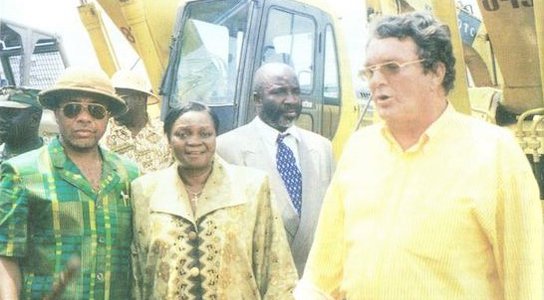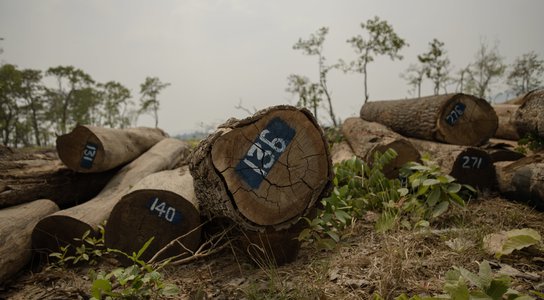Twenty-two years ago Global Witness cut its teeth exposing the trade in conflict timber in war-torn Cambodia. Posing as European timber buyers, my colleagues and I exposed how the genocidal Khmer Rouge was selling wood to logging companies just across the border in Thailand. We found that this generated $10-20 million per month – money the Khmer Rouge used to wage war against the state, to maintain their occupation of much of the country and, critically, to undermine a peace process that had seen the UN undertake its then biggest peacekeeping intervention ever.
Following our exposés and under pressure from its key partners, Thailand closed its Cambodian border to timber imports in May 1995. Within 18 months, their money supply gone, the Khmer Rouge had defected to the side of the government and the decades-long war finally came to an end.
Lesson learned? Er…no. In 2001 I found myself as part of a Global Witness team probing the trade in conflict timber in Liberia. After the UN Security Council imposed sanctions on the export of diamonds from Liberia, timber became the financial lifeline for the country’s President – warlord Charles Taylor. In Liberia the issue was even more disturbing than in Cambodia because timber wasn’t just a cash cow - the ships that took the timber out returned with their holds stuffed with the armaments Taylor needed to fight.
Working with extraordinarily courageous Liberian colleagues we managed to put together a forensic documentation of Liberia’s timber trade including key European timber traders. Confronted with this information the companies responded that the trade was legal and that there were no guidelines telling them what to do in circumstances like this.
We lobbied for UNSC sanctions on Liberian timber – a process that we finally won in May 2003 - but it took 18 months to achieve. By August, Charles Taylor was under arrest and another timber-funded war was over. Taylor was later sentenced to 50 years in prison for the carnage he wreaked in neighbouring Sierra Leone. In another rare and important conviction, Gus Kouwenhoven, Taylor’s business partner and timber baron, was last month sentenced to nineteen years by a Dutch court for complicity in war crimes.
But what happened to all of those companies, especially the European ones, that made this trade possible through their timber purchases? Nothing – they walked away with their profits intact. They have faced no legal consequences and they have paid no compensation to the countries their business helped destroy. These companies continue to buy timber from the tropics and in the intervening years have been dogged by allegations of human rights abuses and sourcing illegal timber.
Lesson learned? Um….a bit. As part of its efforts to tackle global deforestation (the FLEGT Action Plan), the EU has introduced laws banning the import of illegal timber into Europe (EU Timber Regulation). But, as recognised by FLEGT’s own 2016 evaluation, the EU hasn’t yet followed through on its commitments to address the issue of conflict timber.
This has had fatal consequences. The EU continued negotiating a timber trade agreement (Voluntary Partnership Agreement) with the Central African Republic (CAR) when civil war broke out in 2013 and conflict timber once again raised its ugly head. Throughout the conflict, CAR timber continued to flow into Europe, directly funnelling 3.4 million euros to armed groups.
As the EU develops a work plan for FLEGT on the back of its review, we set out in our latest briefing how it should develop a framework to tackle conflict timber. That framework should tackle both the supply and demand sides – through FLEGT and the EU Timber Regulation. It should seek to prevent conflict timber by ensuring that all FLEGT programmes and Voluntary Partnership Agreements address relevant risks. And where conflict breaks out, it should be ready to suspend VPAs and make public statements identifying risks so that European importers can’t pretend they’re unaware of them.
In its FLEGT Action Plan and EU Timber Regulation, the EU has shown it recognises these risks. It’s now time to turn those words into action and ensure that the EU and European traders will never again be complicit in the trade of timber to fuel conflict.


